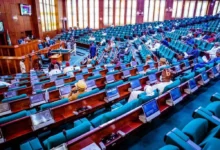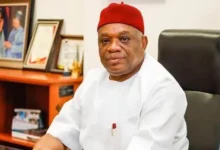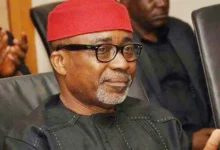
Imo’s House of Assembly has been encouraged by civil society organizations (CSOs) to enact a resolution requiring State Governor Hope Uzodimma to hold municipal elections before May 2024.

CSOs request that the Imo Assembly force Uzodimma to hold the LG election.
Speaking on Sunday at a combined press conference in Owerri, the organizations highlighted that Imo hadn’t held LG elections since August 2018.
But even so, they pointed out that when Governor Hope Uzodimma took office in May 2019, the group of LGA officers chosen was removed.
Thus, the CSOs, which included Christian Aid, the Tax Justice and Governance Platform, and the Civil Society Legislative Advocacy Center, observed that the lack of leadership at the LG level is preventing the state’s citizens from moving forward as they ought to.
They gave Governor Hope Uzodimma a three-month window in which to hold the state’s local government elections.
Additionally, the CSOs pushed the state’s House of Assembly to approve a resolution requiring the Imo State Independent Electoral Commission to start organizing the polls by the end of May.
“Imo State Economic Challenges and Debt Management amid Economic Uncertainties in Nigeria” was the headline of the news conference statement made by Mr. Chibundu Uchegbu, the state coordinator of the Tax Justice and Governance Platform. He stated that the LG elections were long overdue.
According to Uchegbu, “the lack of leadership at the LG level is preventing the people of the state from progressing as they should.”
“Imo last held LG elections in August 2018, and the group of elected LGA officials was dissolved by a new government in May 2019, less than a year after they took office.
Since then, unelected individuals have been in charge of the state’s LG system, depriving the populace of their democratic rights, hopes, and advantages.
“The system of local government by democratically elected local government councils is under this Constitution guaranteed; accordingly, the government of every state shall, subject to Section 8 of this Constitution, ensure their existence under a Law, which provides for the establishment, structure, composition, and finance functions of such councils,” states Section 7 (1) of the 1999 Constitution as amended, which is clearly violated by this.
He claimed that despite the enormous amounts of money that the Federation Account Allocation Committee deposits into their treasury each month, LGs are not fulfilling their obligations to the grassroots community.
“This is a result of the State Government’s preference to manage the LGAs’ affairs through appointees,” he stated.
In order to allow the newly elected LG Chairmen to carry out their duties as best they could, they pleaded with the State Government to refrain from interfering.
The “escalating debt burden in the state” was another grievance voiced by the CSOs.
They contended that the state’s internal debt profile was over N220.8 billion as of June 30, 2023, according to data from the National Bureau of Statistics.
Uchegbu claims that the unemployment rate was 56.6 percent at the time, and that the foreign debt profile at the same time was a startling $77.8 million in US dollars.
He said that over 6.7 million people in Imo were negatively impacted in one way or another by the growing debt load.
He urged state legislators to “pass legislation requiring every loan collected by the government, both foreign and domestic, to be tied to identifiable development programs and projects, capital expenditure, and projects.”
The group demanded that the state pass a Fiscal Responsibility Law that would prioritize debt management, responsibility, and openness in all fiscally related concerns.
It was suggested that the law should explicitly state that taking on debt should only be done for initiatives that advance the growth of value chains, enhance the macroeconomic environment, create infrastructure, and generate critical human capital.
In addition, the law was to “stop borrowing for dilatory capital expenditure that adds no value to economic growth, wealth creation, and development, among others, and recurrent expenditure (personnel and overheads)”.
The CSOs further encouraged the governor to give the agricultural value chain top priority, claiming that doing so would significantly boost the Imo economy’s recovery. (NAN)











